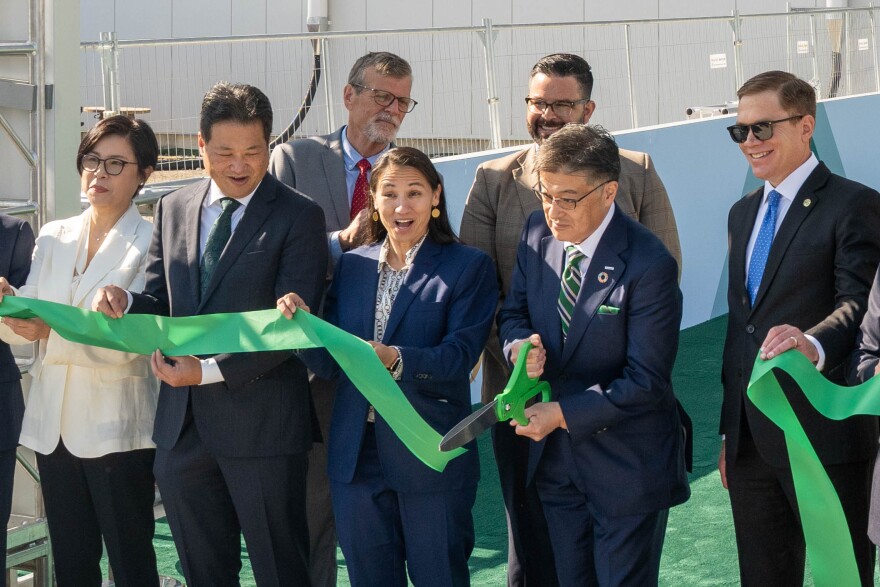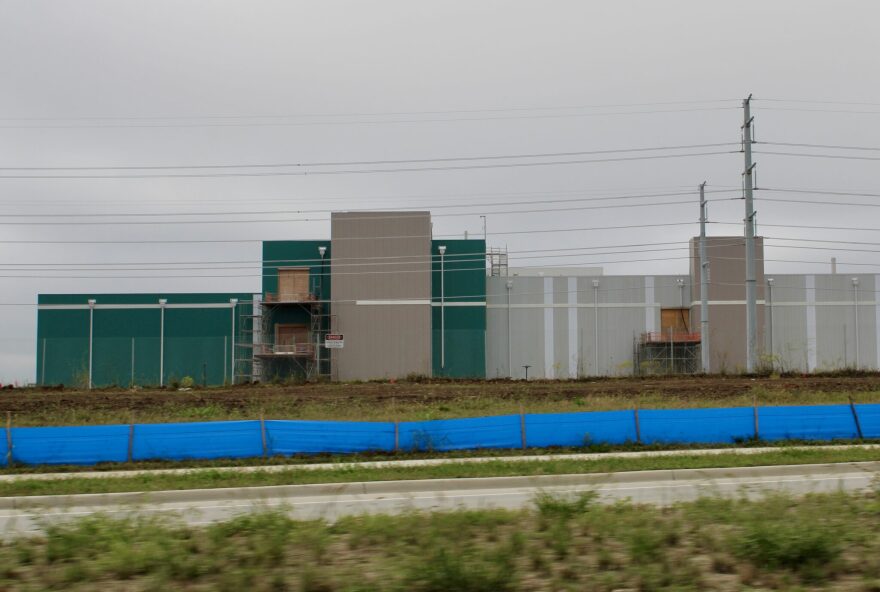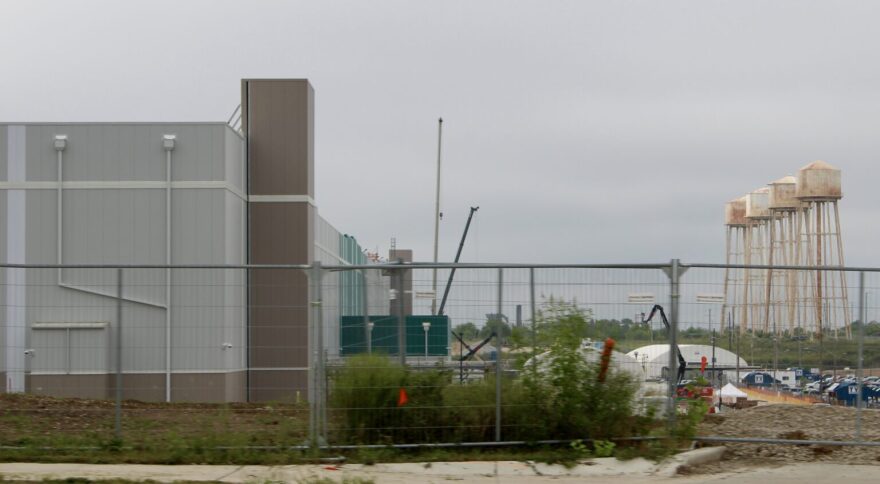DE SOTO — This small town is moving forward with plans for major developments even though Panasonic may delay full production at its new electric vehicle battery plant.
The newest developments include plans for hundreds of housing options with apartments, homes and a hotel, in addition to the opening of a data center and an expansion to Merck Animal Health's facility.
De Soto is a town of about 6,500 people, so the planned hiring of 4,000 people at Panasonic, in addition to new housing and other businesses coming to town, means at least an additional 60% of people spending time at local businesses and using roads and other town infrastructure. Some residents are coping with the changes to the town's character and desire for more information about environmental impacts from new development.
De Soto Mayor Rick Walker said he is confident Panasonic will meet its obligations and this his opinion about the project hasn't changed.
"It was good for the city when we first saw it. It's still good for the city," he said. "I mean, it's a generation worth of improvements that were built in a span of three years, and that's just completely unimaginable that we would have been able to do that. But it's happened and it's here and no regrets, no second thoughts."
The $4 billion Panasonic plant was expected to reach full production by March 2027 but reports suggest that goal has been delayed due to the dropping electric car sales and federal policies that don't support green energy.
Sarah King, Panasonic Energy chief people officer, and Panasonic spokesperson Alison Klooster did not respond directly to questions about when full production would begin but said they are still planning to reach the original planned output.
"I think it's something similar to how we opened in July, like yeah, I believe our initial goal was quarter one of 2025. It was a few months later, but we did open and we're up and running," Klooster said.
Many factors are at play, making it difficult to provide a specific timeline, she said. Hiring sustainability and construction timing are some of those factors, Klooster added.
She said the plant just sent out its millionth battery last month.
"People want things to happen on different timelines sometimes, but it's happening on the timeline that we can sustain in the community and make sure that we make a lasting, positive impact," Klooster said.
The factory has hired just over 1,200 employees, including production workers and support staff, and is still on track for 4,000 total employees, King said.
It's also dependent on apprenticeship programs and time needed to get workers ready, she said.
"We're finding that these programs are so strong that people are able to actually come in and get to work faster than what we really thought that they were going to be," she said.
King said employees are still being hired from within a 50-mile radius of De Soto.
Panasonic's impact

De Soto's 2023 Panasonic development agreement included a tax increment financing district for the company, which uses property tax collected from the increased value of the development to pay for costs associated with needed infrastructure improvements.
The agreement provided about $229 million for public infrastructure projects like roadway construction, water treatment storage, sewer treatment and fire safety projects.
Most of the infrastructure projects included in the agreement are either almost done or will be done in early 2026, Walker said.
The agreement also noted that in order to receive the tax increment financing funding, Panasonic must invest at least $1 billion and operate the facility that employs 2,500 full-time employees.
Walker said he's spoken with Lt. Governor David Toland and others from the Kansas Department of Commerce about what De Soto projects mean for the greater Kansas economy. De Soto remains a key part in attracting business to Kansas, he said.
"When you're sitting on the sidelines and you've adjusted maybe to Panasonic coming and then another big project comes, that seems like whiplash," Walker said. "But these projects have been a long time coming."
De Soto City Council President Rob Daniels said community response to all the developments is mixed, but most residents acknowledge that change was coming.
Development on the former Sunflower Ammunition Plant was going to happen with or without Panasonic, Daniels said.
"You don't spend a billion dollars or more cleaning up a site for it to sit and be nothing," he said.

He said the development is good for the community, and also noted that EV sales slowing doesn't mean the industry is dying off.
All these projects are to the benefit of the community, whether it's getting a new community center without having to raise taxes or continuing to lower the city's portion of property tax bills, he said.
Future data center
The city council recently approved a development agreement with Mount Sunflower LLC for a $3.1 billion data center at Flint Commerce Center south of Kansas Highway 10, which runs through De Soto's south side.
The four buildings would total approximately 1.14 million square feet with construction targeted to start this spring, Walker said. The project won't be completed until around 2035.
The project will use industrial revenue bonds, which enable property tax abatements and construction sales tax exemptions.
The center itself won't bring a lot of jobs, but construction will bring workers to the area, which will increase retail activity, Walker said.
The city will also receive franchise fees from the center's electricity use once it is up and running, he said.
Walker said that although data centers are not the right fit for everywhere, this spot was already appropriately zoned and will be a "less intense use" than previously envisioned. Originally, the plan was to have another 8 million square feet in addition to the already existing building, with possibly 1,000 employees and truck docks, he said.
The data center will ultimately be around 100 employees and will have significantly less traffic and noise impacts than previously planned for, he said.
Residents spoke at a city council meeting in August expressing concerns about the project's environmental impacts, especially water use.
Martin Boyda, a resident of Kansas City, Kansas, said he has concerns about the water and electricity usage necessary for a data center.
He said he has wondered if the city has the infrastructure necessary to make this center possible. He also said he is an avid user of the river and has concerns about ecological impacts of increased water being pulled from it.
"We hear about the millions of gallons a day that these data centers use, and that brings concern to me, and it would be nice to get some information about whether we have the capacity ecologically to support a situation like this," he said.
Walker said Kansas is one of the greener power producing states in the country, making it a better place for this type of center. He also said this project would have less storm water runoff because of less impervious surfaces with this development. The city will work with the Kansas Department of Health and Environment throughout the process to ensure they are abiding by state environmental standards, Walker said.
"Data centers are a necessary part of the infrastructure," Walker said. "There are environmental issues associated with it, but it's true for any development, and I think that given what this project brings, the environmental concerns can be planned in the process, mitigated. We rely on our planning process, along with KDHE and their permitting to ensure that we're not creating an adverse impact for our community."

Residents have shared concerns about the electricity and water needed for the data center, but the facility will not make residents' bills higher, he said.
Walker said the city will work to make sure the facility is using best practice for efficient water use, but also said it is in their best interest to use less in order to spend less.
Evergy has planned for the power necessary, and the Kansas Corporation Commission has instituted rules that say heavy users that put strains on the system will pay more, Walker said.
The city has the capacity to provide the water necessary without causing adverse impacts on the area, he said.
De Soto resident Dally Holloway said with all the growth in De Soto, many residents feel as if they weren't getting clear answers about what was happening. More people started wanting more information about development, she said.
"They don't seem to like the idea of a multibillion dollar corporation that we don't even know who it is receiving what citizens feel is tax-free opportunities to build on land without citizen input," Holloway said.
Pam and Doug Ebert, De Soto residents and owners of the Cedar Lane Bed and Breakfast, described their feelings toward recent development as "cautiously pleased."
More people and more businesses coming to town is a plus, but there's a way to expand while keeping the small town-feel and keeping any strain off the existing community, they said.
Doug Ebert said he is glad to see other industries go into the area in case EV sales slow. His other concerns are about increased traffic in town, but said the additional money for road upkeep and other ancillary businesses coming to town are a positive.
"Well, when you've got more people working in an area, the infrastructure around that area does get built up," he said.
Other development
Merck Animal Health announced earlier this year a $895 million expansion with plans to create 200 new jobs.
Merck will invest $860 million in its existing facility and another $35 million its research and development lab. It'll be about 200,000 square feet once expanded.
Walker said Merck has submitted construction documents to city staff for them to review and seem to be on track to get permits completed for construction to start in the spring, he said.
De Soto is also continuing to plan for GRATA Development's Limestone project. The mixed-use project has gone through the first step after the city council approved an incentive package and new zoning for the area.
The project includes a new hotel with 75% tax abatement for 10 years, and around 100 homes part of a reinvestment housing incentive district. The additional homes will help with the city's limited housing supply, Walker said. The project also includes a 350-unit multifamily residential development that will also receive 75% tax abatement for 10 years, according to the meeting agenda.
De Soto resident Toni Caldwell said she tries to look at development from both sides — but ultimately is sad to see the changes coming to town. She also has concerns about transparency surrounding the projects, traffic and tax abatements, she said.
Caldwell said she knew the town was struggling economically, and had problems keeping up with infrastructure needs. That's something that Panasonic has helped with, she said, but she still has concerns about its environmental impacts.
She said it's disappointing to see changes to the community she's lived in for so long but that she knows change was inevitable with the open land.
"You really have to look at both sides of it, and it's hard to do when it's a community you love and it's changing, and so it makes it very difficult," she said.
This story was originally published by the Kansas Reflector.
Copyright 2025 KCUR 89.3

